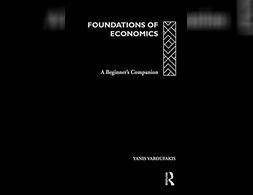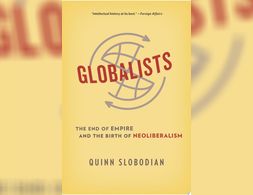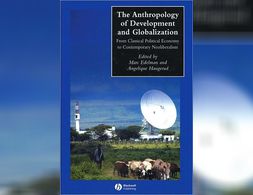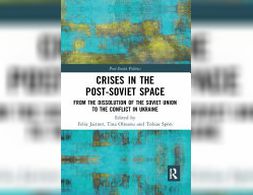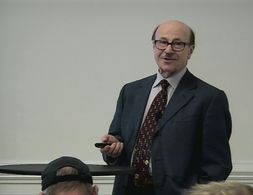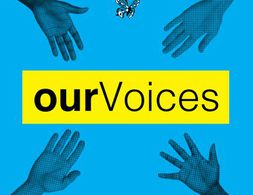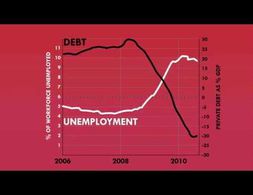✕
296 results
The 2007–08 credit crisis and the long recession that followed brutally exposed the economic and social costs of financialization. Understanding what lay behind these events, the rise of “fictitious capital” and its opaque logic, is crucial to grasping the social and political conditions under which we live. Yet, for most people, the operations of the financial system remain shrouded in mystery.
This book gives a very clear overview of the history of Macroeconomics and how it has evolved. It reflects on the different perspectives and debates that have defined the field, with valuable insight into the history and theory of economic policy.
With a focus on Chile, Pinochet’s Economic Accomplices: An Unequal Country byForce uses theoretical arguments and empirical studies to argue that focusing onthe behavior of economic actors of the dictatorship is crucial to achieve basic objectivesin terms of justice, memory, reparation, and non-repetition measures.
In this book, the author, Intan Suwandi, engages with the question of imperialism through the specific channel of Global Value Chains.
This book offers the first systematic analysis of economic thought concerning war.
As the world's energy system faces a period of unprecedented change, a global struggle over who controls the sector--and for what purposes--is intensifying. The question of "green capitalism" is now unavoidable, for capitalist planners and anti-capitalist struggles alike.
This is an important contribution that defends the importance of heterodox economics. It discusses what constitutes heterodox economics as an intellectual, social, and political project, with a range of contributions from leading heterodox thinkers coming from a diversity of theoretical vantage points.
In this searing and insightful critique, Adrienne Buller examines the fatal biases that have shaped the response of our governing institutions to climate and environmental breakdown, and asks: are the 'solutions' being proposed really solutions? Tracing the intricate connections between financial power, economic injustice and ecological crisis, she exposes the myopic economism and market-centric thinking presently undermining a future where all life can flourish.
Foundations of Economics breathes life into the discipline by linking key economic concepts with wider debates and issues. By bringing to light delightful mind-teasers, philosophical questions and intriguing politics in mainstream economics, it promises to enliven an otherwise dry course whilst inspiring students to do well.
Why is it that some countries become rich while others remain poor? Do markets require regulation to function efficiently? If markets offer an efficient way of exchanging goods, why do individuals even create firms?
The objective of this MOOC is to develop an understanding of the problems related to water management. Firstly, this course will define a resource and, more specifically, the resource of water. It will look at how water is used and the activities associated with it as well as any potential conflicts. The course will look at water management in detail through the analysis of the different types of rights and obligations associated with, for example, the development of a multi-sectorial regulation system or a watershed management approach.
This book provides a comprehensive description of this intriguing new area of feminist economics. It includes discussion of what constitutes feminist economics and how feminist economics is different from other approaches
Noneconomists often think that economists' approach to race is almost exclusively one of laissez-faire. Racism, Liberalism, and Economics argues that economists' ideas are more complicated.
Imperialism is not only about military force and political pressure applied by developed capitalist countries on less developed ones for economic gain It also has an everyday dimension Countless acts of production and consumption the current SUV boom being a prominent example draw on exploitation of resources and labour from …
The world's leading economist of inequality presents a short but sweeping and surprisingly optimistic history of human progress toward equality despite crises, disasters, and backsliding.
In the first intellectual history of neoliberal globalism, Quinn Slobodian follows neoliberal thinkers from the Habsburg Empire’s fall to the creation of the World Trade Organization to show that neoliberalism emerged less to shrink government and abolish regulations than to deploy them globally to protect capitalism.
A comprehensive account of how government deficits and debt drive inflation
Our public services are in dire need of investment. But in the middle of a debate over competing spending plans, isn’t it also time to ask what we want our public services to actually do for us? That’s the view of group of economists and campaigners who are pushing for something called ‘Universal Basic Services’ – a radical expansion of high-quality public services for all to areas like transport, childcare and social care.
In this volume, Katz offers a detailed summary of the foundations, evolutions and approaches of Dependency Theory in Latin America, focusing on the regional interpretations of Marxism, Developmentalism and World-Systems Theory.
This course will fundamentally ask whether we can, or even should use the word ‘decolonising’ in our pursuit of a better economics?
The Anthropology of Development and Globalization is a collection of readings that provides an unprecedented overview of this field that ranges from the field?s classical origins to today?s debates about the ?magic? of the free market.
The novel coronavirus (Covid-19) is rapidly spreading around the world. The real economy is simultaneously hit by a supply shock and a demand shock by the spread of coronavirus. Such a twin shock is a rare phenomenon in recent economic history.
From the Dissolution of the Soviet Union to the Conflict in Ukraine The breakup of the Soviet Union led to the creation of new states and territorial conflicts of different levels of intensity Scrutinising the post Soviet period this volume offers explanations for both the frequency and the intensity of …
Social and Solidarity Economy (SSE) and Feminist Economics make a conjoint statement: The way we see the economic system has nothing to do with human beings nor those who have been surviving outside the market.
The goal of this course is to explore these differences in economic outcomes observed among women and men, measured by such things as earnings, income, hours of work, poverty, and the allocation of resources within the household. It will evaluate women’s perspectives and experiences in the United States and around the world, emphasizing feminist economics.
Donald Trump won in 2016 largely because enough voters in three states, all in the Rustbelt, which had voted for Barack Obama in both 2008 and 2012, switched their electoral votes from Democratic to Republican.
In this podcast, Laura Basu focuses on how capitalist markets and nation-states perpetuate structural racism.
The usual background and distinctions between complexity and neoclassical economics are presented Neoclassical economics deals with perfectly rational representative agents this creates states of equilibrium On the other hand complexity economics relaxes these assumptions to deal with responsive agents in an uncertain dynamic environment this creates states of disequilibrium More …
Representing everyone An Analysis of the Representation of Migrant Women by official Labour Organizations in Germany Author Tess Herrmann Review Deborah Sielert This is an essay of the writing workshop Gender and the Economy Perspektives of Feminist Economics published on 17 May 2017 updated on 16 August 2017 Why we …
Exploring Economics, an open-source e-learning platform, giving you the opportunity to discover & study a variety of economic theories, topics, and methods.
Banking 101 is a series of 6 short videos that ask the following questions: How do banks work and how is money created? Is reveals common misunderstandings of money creation and the role of banks. Furthermore, the videos show how models taught in many introductory classes to economics (Econ 101) do not reflect those processes:
Part 1) “Misconceptions around Banking” questions common comprehensions of how banks work (savings = investments).
Part 2) “What's wrong with the money multiplier” states that the model of the money multiplies is inaccurate.
Part 3) “How is money really made by banks” explains the process of money creation, loans and inter-bank settlement.
Part 4) “How much money banks create?” asks what limits the money creation by banks and presents the difference between reserve ratio, liquidity ration, equity and refers to the inter-bank market.
Part 5) Explores the question if banks create money or just credit and especially refers to credit risks.
Part 6) Explains how money gets destroyed when loans are paid back.
Note: The videos refer to the UK monetary and banking system, some explanations don't apply to other banking systems, e.g. the reserve ratio.
We use cookies on our website. Click on Accept to help us to make Exploring Economics constantly better!










